Key takeaways:
- Policy failures often arise from insufficient stakeholder engagement and a lack of understanding of community needs.
- Learning from past mistakes is essential for developing effective policies and fostering trust within communities.
- Clear communication, adaptability, and iterative feedback are vital for successful policy implementation.
- Collaboration across disciplines can lead to innovative solutions that better address the diverse needs of affected populations.
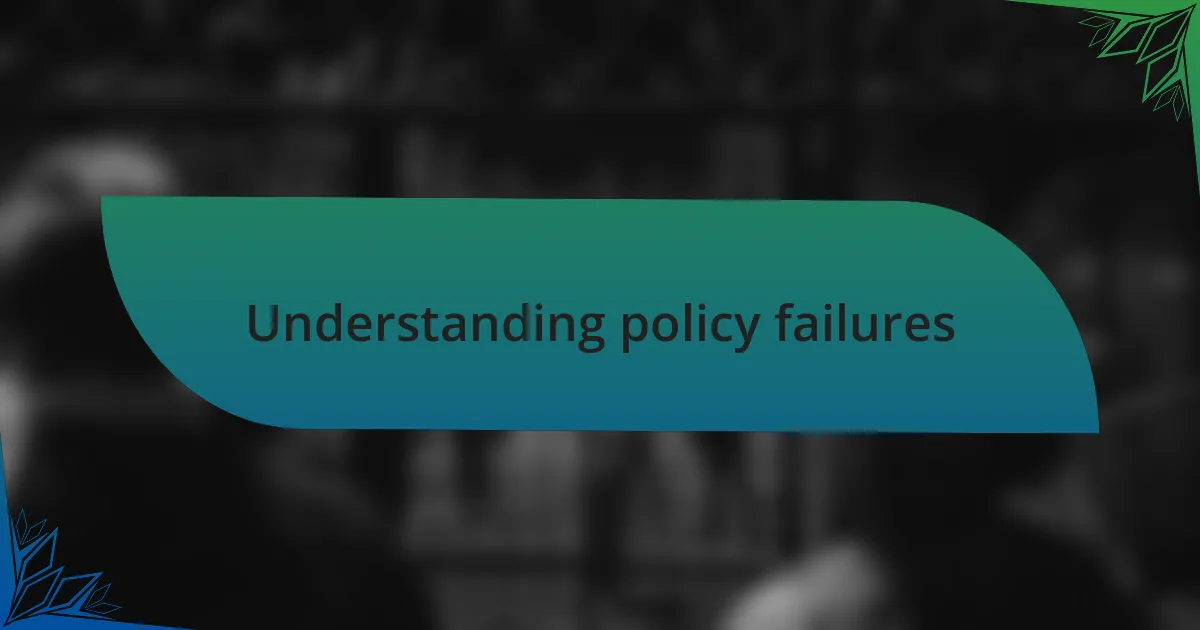
Understanding policy failures
Understanding policy failures often requires a deep dive into the decision-making processes behind them. I’ve seen firsthand how well-intended policies can falter when they lack sufficient research or fail to consider the needs of those they aim to serve. It leaves you wondering—how could something that seemed so right go so wrong?
In my experience, one of the most common pitfalls in policy-making is the assumption that experts know better than the communities affected by these policies. A few years back, I observed a local policy intended to improve public transportation. It was developed without engaging with the very people who relied on the buses daily, resulting in routes that didn’t meet their needs at all. How can we expect success when the voices of those impacted are so often left unheard?
Moreover, the emotional toll of policy failures can be profound. I remember speaking with individuals who had their lives upended by a housing policy that aimed to address homelessness but inadvertently pushed people further into crisis. It struck me then that behind every statistic is a story, a life affected by decisions made far away in an office. Isn’t it our duty to ensure those stories are an integral part of policy discussions?
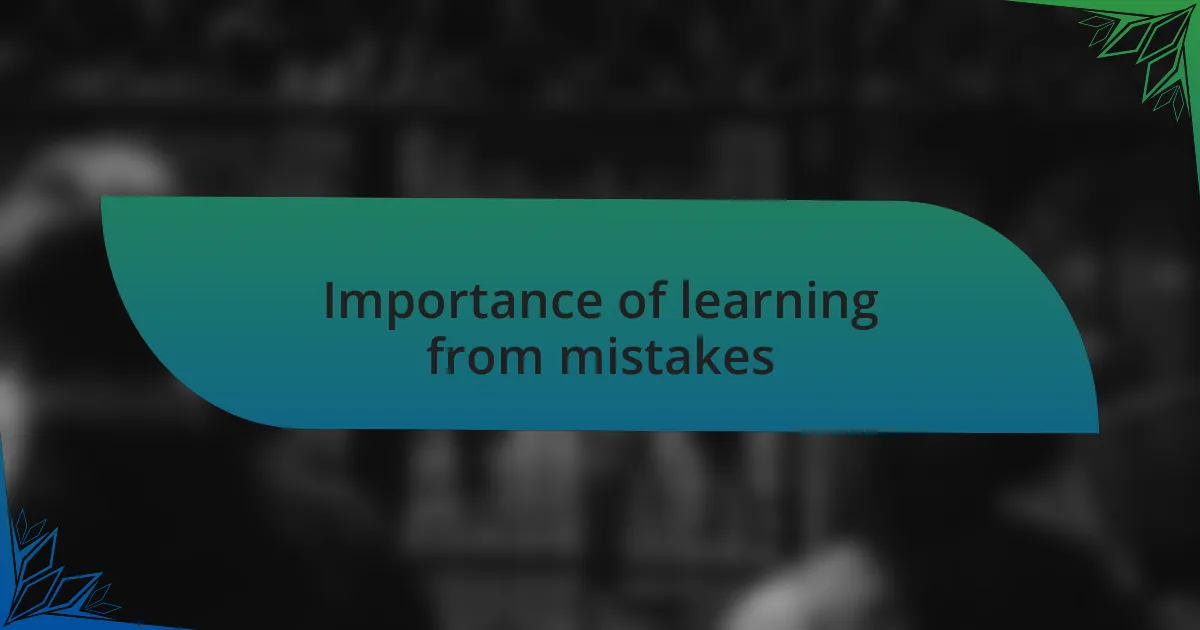
Importance of learning from mistakes
Learning from mistakes is crucial in the realm of policy-making. I recall attending a city hall meeting where the council discussed a failed initiative meant to boost local businesses. The room was filled with frustrated entrepreneurs who shared their experiences—what they thought were opportunities turned out to be obstacles. Listening to them reinforced my belief that we must analyze our failures not only to correct them but to prevent similar missteps in the future.
Every setback carries lessons that can shape better outcomes in the long run. I often think about a healthcare policy that aimed to expand access but ultimately created more barriers for vulnerable populations. Those involved shared heartfelt stories of how it impacted their lives, which served as powerful reminders that we need to embrace these lessons. How can we create effective solutions if we ignore the very consequences of our actions?
Furthermore, acknowledging our errors fosters a culture of accountability that is vital for democracy. I remember a colleague of mine who advocated for transparency after a failed education policy. It was inspiring to see how he emphasized the importance of sharing mistakes publicly to not just rectify them but also to build trust with the community. Isn’t it time we recognized that learning from our missteps is as valuable as celebrating our successes?
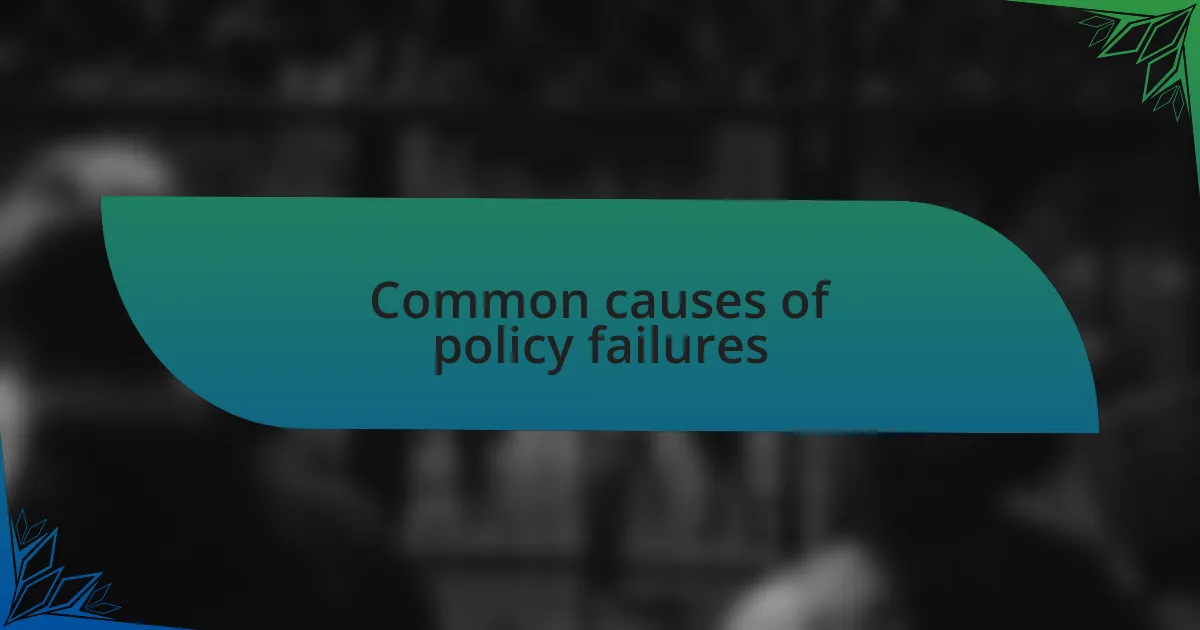
Common causes of policy failures
One common cause of policy failures is the lack of stakeholder engagement. I remember watching a local environmental initiative flop simply because the voices of community members were missed. It was heartbreaking to see a well-intentioned plan ignored what residents truly valued—beautiful open spaces and local wildlife—leading to widespread discontent. Isn’t it crucial that the people directly impacted by policies have a seat at the table?
Another significant factor is inadequate data analysis. I once participated in drafting a transportation policy that relied too heavily on outdated traffic studies. The result? Funding was allocated to areas that didn’t need it, while other regions, which were struggling with congestion, went unnoticed. How often do we fall into the trap of assuming that past data accurately represents current realities? Our decisions should be rooted in the most relevant, up-to-date information available.
Additionally, unclear policy goals can derail even the most promising initiatives. I vividly remember a public health campaign aimed at reducing smoking rates. The message was muddled, making it challenging for the community to understand the purpose or the desired outcome. How can we expect people to rally behind a policy if they don’t even grasp what it’s attempting to achieve? Clear objectives not only inspire action but also create pathways for evaluation and adjustment.
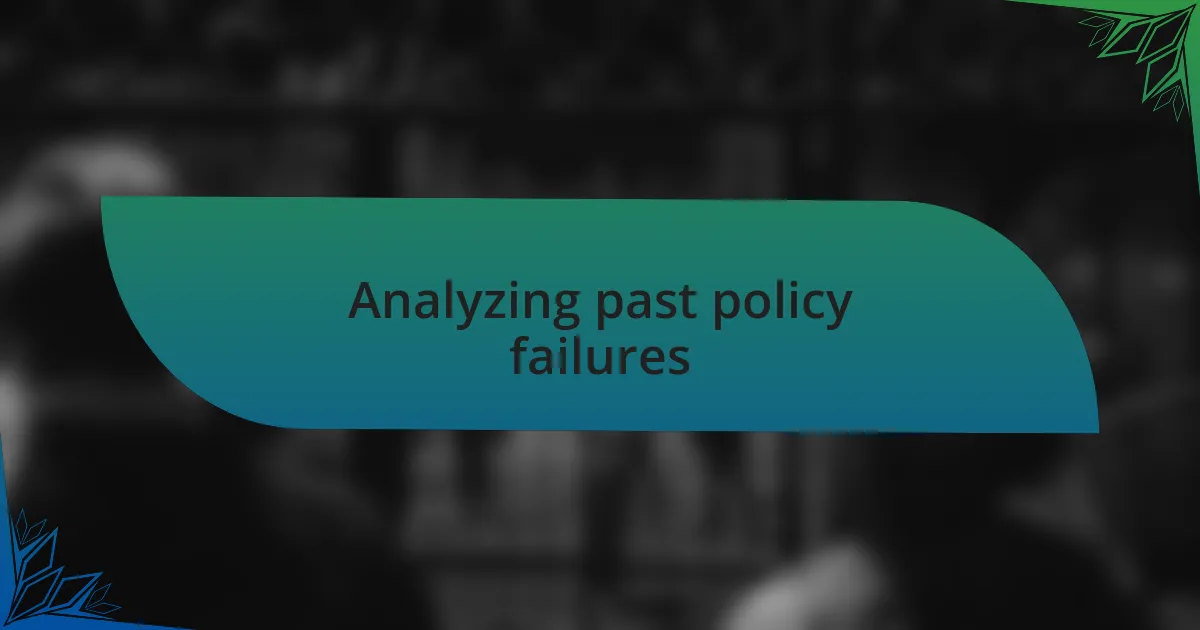
Analyzing past policy failures
One of the most enlightening experiences I had while analyzing past policy failures was in the realm of education reform. A government initiative aimed at reducing class sizes seemed straightforward but faltered severely due to rapid implementation without teacher input. When I spoke with educators, many expressed their frustration, noting that smaller classes wouldn’t solve deeper issues like insufficient training or resource gaps. How could policymakers overlook the wisdom of those on the front lines?
In examining healthcare policy failures, I recall a particularly disheartening case involving a mental health initiative that was poorly funded and executed. The intentions were noble, yet the lack of collaboration with mental health professionals resulted in services that weren’t tailored to the community’s unique needs. Hearing stories from families who faced insurmountable hurdles to access care was a wake-up call. If we truly want to support vulnerable populations, shouldn’t we first listen to those who understand their challenges most intimately?
Looking at environmental policies, I remember when a renewable energy program aimed to transition communities away from fossil fuels. Unfortunately, without comprehensive community education, many residents were left confused and resistant to change. The disconnect was palpable; people felt left out of a conversation that directly affected their lives. Isn’t it vital that we not only share information but also foster an inclusive dialogue around such pivotal shifts? Understanding people’s concerns could pave the way for more successful policy outcomes.
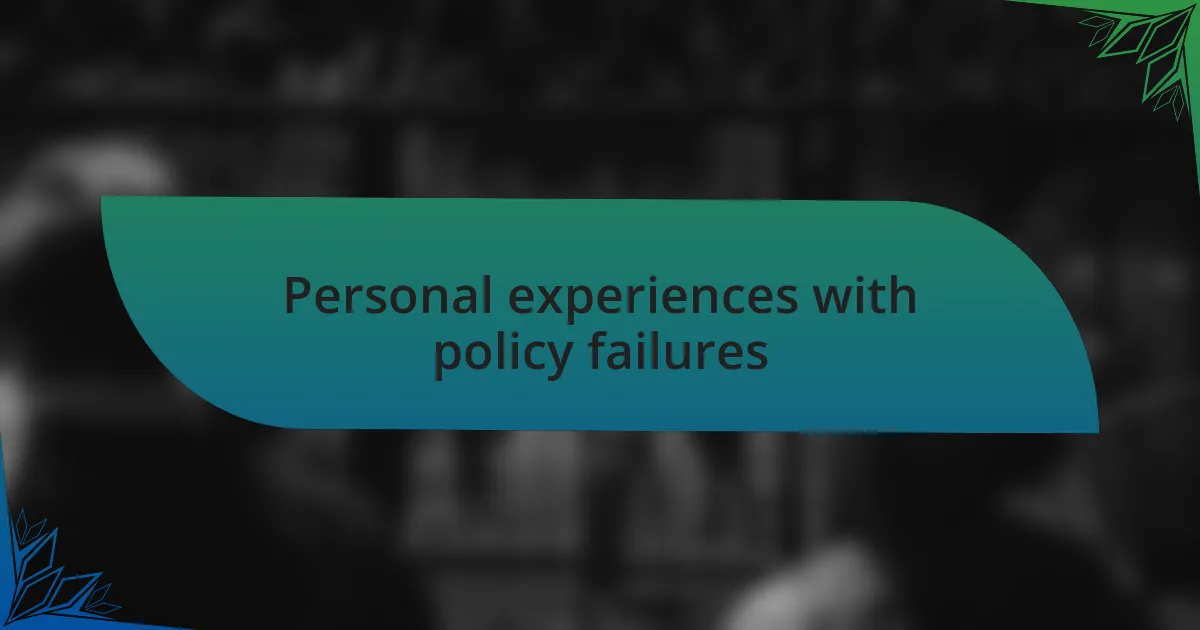
Personal experiences with policy failures
Reflecting on my encounters with policy failures, I vividly recall a local transportation initiative that promised to improve public transit access. The roll-out was swift, but without adequate surveys to gauge community needs, many vital routes were completely overlooked. Listening to frustrated commuters during a town hall meeting was eye-opening; their stories underscored how important it is to genuinely engage with those affected by such policies. Why do we so often forget that successful change is rooted in shared understanding?
In another experience, I was involved in a community health project focused on increasing vaccination rates. The program aimed high but faltered when it failed to consider cultural sensitivities. Conversations with community leaders revealed that mistrust often stemmed from historical injustices, which the policy didn’t address. This realization left me questioning how many initiatives fail simply because broader contexts are ignored. If we want genuine progress, shouldn’t we prioritize empathy and informed engagement?
Then there was a renewable energy initiative I tried to advocate for in my neighborhood. It promised environmental benefits but included no local input on technology that was both unfamiliar and intimidating. Attending a community meeting, I witnessed the unease among residents, many of whom felt they were being sold a solution rather than being part of the solution. Can we create meaningful change without first making efforts to cultivate trust and understanding in our communities?

Lessons learned from my experiences
One crucial lesson I’ve learned is that communication is not just about relaying information; it’s about fostering a connection. In one policy effort, I found myself struggling to convey the benefits of a new education reform. I soon realized that my audience needed more than facts—they craved a conversation that addressed their concerns and aspirations. It struck me then: how can we expect people to embrace change without first inviting them into the dialogue?
Another takeaway is the necessity of adaptability. During a climate action initiative, we encountered significant pushback when we implemented a one-size-fits-all approach. Recognizing this, I advocated for a flexible framework that allowed for localized strategies. The result? Communities felt empowered to tailor solutions, fostering not just compliance, but genuine enthusiasm. How often do we cling to rigid plans, ignoring valuable feedback in the process?
Finally, I learned the importance of perseverance paired with humility. I once championed a housing policy that promised affordable options, only to face numerous setbacks due to funding issues. Each failure was disheartening, yet it taught me resilience. I began to understand that every setback was an opportunity to learn and reevaluate our approach. Isn’t it fascinating how our failures can often lay the groundwork for future success?

Applying insights to future policies
Applying insights to future policies
When I reflect on my past experiences, I often think about how crucial it is to listen and learn from the communities affected by policy decisions. There was a project where we introduced a new health initiative, but it floundered because stakeholders felt unheard. That failure taught me a powerful lesson: engaging the community right from the start can transform resistance into partnership. How can we expect to develop effective policies without understanding the real needs on the ground?
Moreover, I discovered that iterative feedback is vital for refining policies. During a city planning project, we initially rolled out a transportation policy that didn’t meet user expectations, leading to dissatisfaction. After conducting focus groups and adjusting based on what we learned, we created a more user-friendly approach. Isn’t it interesting how a few adjustments, informed by direct feedback, can turn a misstep into a model for success?
Finally, I’ve come to realize that collaboration across disciplines can illuminate overlooked solutions. In one instance, I worked with environmental scientists to rethink urban development. This cross-pollination not only resulted in innovative strategies but also fostered a sense of shared ownership among all stakeholders. Isn’t it remarkable how diverse perspectives can create policies that are not only effective but also resonate with a broader audience?